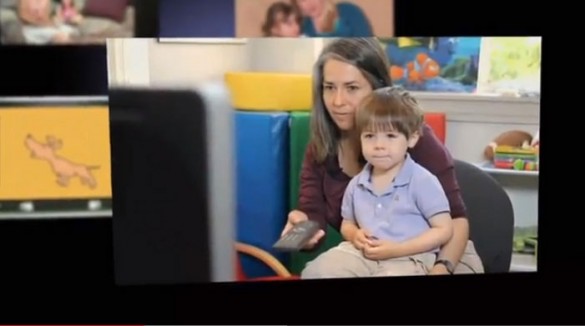
The animated characters in your preschooler’s favorite TV show invite her to interact, play and learn. But is she learning? Only a little, according to a Vanderbilt study, which found that educational programming is minimally effective unless parents watch too—and engage the child.
In a first-of-its-kind study, parents were trained to pause, ask questions and encourage the child to tell parts of the story while they watched educational videos together. When evaluated, the 3-year-olds whose parents used this simple technique—known as dialogic questioning—showed significant gains in vocabulary and comprehension over those who watched alone.
Results of the 2011 study were published in the December 2013 issue of Developmental Psychology.®
“Parents are naturally stopping and talking with their children while reading storybooks, but they aren’t doing that with videos and television,” explained Gabrielle Strouse, who conducted the research as part of her doctoral dissertation at Peabody College of education and human development. “There are a lot of questions about how much small children learn from TV, and this study sheds light on that.”
For the study, 81 parents were provided DVDs of children’s stories to watch over four weeks. The families were assigned to one of four groups: dialogic questioning (pause and ask questions); directed attention (comment but do not ask questions); dialogic actress (an on-screen assistant asking dialogic-style questions) and no intervention.
After four weeks, children in the dialogic questioning group scored higher on story comprehension and expressive vocabulary than the other groups. Researchers concluded that parent-led questioning offered a distinct advantage over the other methods, particularly allowing children to watch unsupervised. The results from the group using a dialogic actress were better than watching alone, though not as effective as the parental involvement.

Strouse conducted the research under the direction of Peabody’s Associate Professor of Psychology Georgene Troseth, whose ongoing research with infants and small children confirms that while videos can be useful learning tools, television is no substitute for Mom and Dad. Troseth has conducted numerous studies on young children’s symbolic development, including their understanding of symbolic artifacts, such as pictures and video images.
“Until children get older, it isn’t natural or easy for them to learn from videos, so they’re going to learn a lot more if you are there helping them, just like you would help them with a book,” Troseth said. “And at any age, don’t give them a steady diet of flopping in front of the television and think that is going to somehow educate them.”
Watch a video about the study.
Study information:
Authors: Gabrielle A. Strouse, Katherine O’Doherty, and Georgene L. Troseth, Department of Psychology and Human Development, Vanderbilt University. The research was supported by a graduate traineeship from the Institute of Education Sciences, U.S. Department of Education, Grant R305B040110 to Vanderbilt University and a Bonsal Education Research Entrepreneurship Award from Peabody College. Additional resources were provided through National Institute of Child Health and Human Development Grant P30 HD-15052 to the Vanderbilt Kennedy Center of Research on Human Development and National Center for Research Resources/National Institutes of Health Grant 1 UL1 RR024975. The published results are based on the Strouse’s doctoral dissertation.
Developmental Psychology® is a registered trademark of American Psychological Association